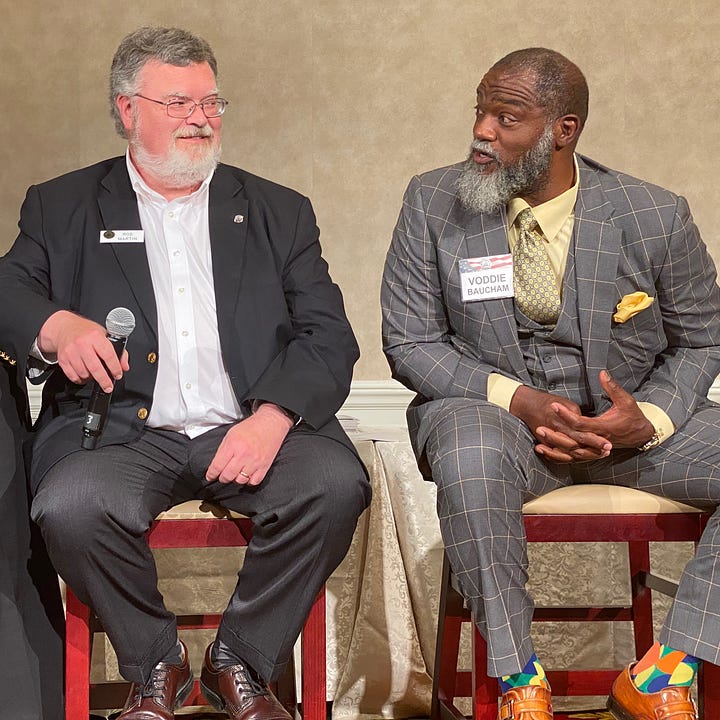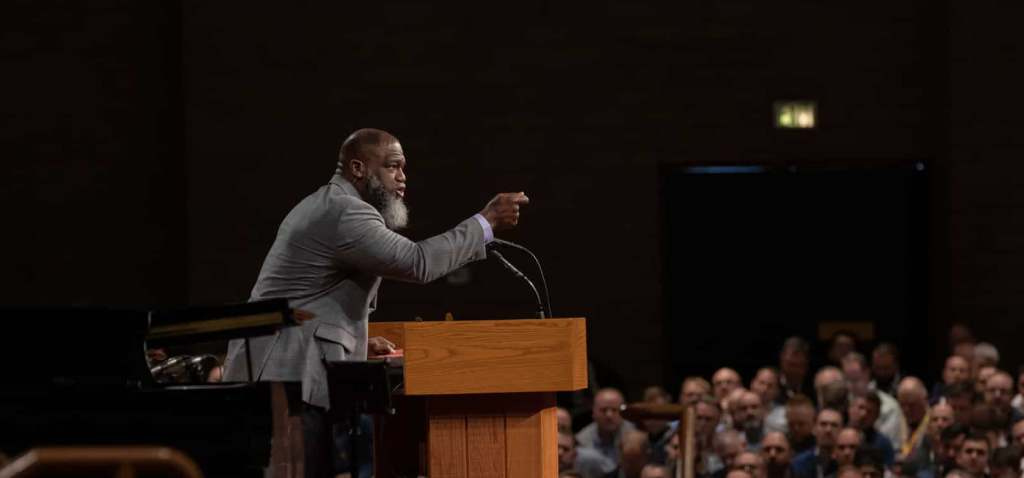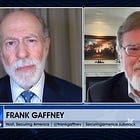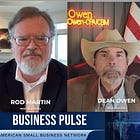Sunday Essay: Voddie Baucham, The Minister of Defense
Voddie defended the faith like a man who had “been with Jesus.” And now he is.
This essay is free, but with Premium Membership you get MORE. Join today.
NOTE: My friend Voddie Baucham died a week ago at the too-young age of 56 (I turned 56 on Friday). He was a lion, and we all miss him terribly. My friend Mark Coppenger here writes a powerful eulogy for Voddie, true to the man’s courage and willingness to pay the price, which originally appeared at the Center for Baptist Leadership. Please read it, and follow both Mark and the Center. — RDM
by Mark Coppenger
October 5, 2025
In the early 2000s, I’d fly down to Louisville to teach some courses at Southern Seminary, and I’d often find myself in the airport shuttle with that day’s chapel speaker, both of us headed home. On these twenty-minute rides, I enjoyed the range of cordial and interesting conversations. In some cases, I was familiar with the speaker from previous contact or exposure to their work.
But when Voddie and I hit campus that week, neither of us knew the other from Adam. From the chapel introduction, I gathered that he was doing something admirable in a church in Texas, and, as for me, he had nothing to go on—just some bi-vocational church planter somewhere around Chicago who was doing something with philosophy, or whatever, now and then on campus. I can’t recall the content of our talk, but I was struck by his infectious energy, warmth, and thoughtfulness.
It didn’t take me long to get up to speed on Voddie (as if that were possible). I soon learned that he was pushing back against the notion that fathers should relinquish their child-rearing responsibilities to professionals and that a father’s chief stewardship of his daughter’s future could be summed up in the resolution, “I just want my little girl to be happy.” Over the next several years, I picked up on other Baucham goodies, and my appreciation only grew. But then, “Boom!” When Michael Brown was killed in Ferguson, Missouri, and the nation went crazy for the BLM agenda, Voddie said, “No, thank you. I’m not jumping on your ideological freight train.”
Didn’t he know that iconic NFL players were running on the field with the “Hands up. Don’t shoot” signal, expressing solidarity with Brown? That salutary riots were roaring and that the coffers of admirably indignant and compassionate social justice promoters were being filled for big-time initiatives. Had he no sense? No heart? And yet, he called them out. Surely, he was going to have to surrender his ethnicity card. Done and done. But no, he took the occasion to school folks on what lay beneath so much of the machinations and histrionics, and it wasn’t Christianly pretty.
On the night I heard of Voddie’s passing and recalled his stand in the midst of the Ferguson hurricane, I thought of Caleb, who, at an advanced age, asked for the privilege of storming the well-fortified Anakim cities on the heights: “Give me this mountain!” Surely Voddie knew that doing so would cost him invitations to speak in Evangelical quarters devoted to signaling their grief over “the stain that remains” in the church, suffocating “systemic racism,” and such. But Voddie pressed on to deliver a variety of “so what’s?” in the form of writings and speeches on the unholy roots of the “critical theory” that sustained a garden of allegedly consecrated delights. He refused to go woke when wokeness was flowering in church and denominational enclaves.


And as Caleb came to mind, so did several other analogous characters. I thought of Reggie White, a fellow Baptist preacher and the Hall of Fame’s “Minister of Defense,” who, as a defensive end for the Packers, was called a “moving nightmare.” So, we see the biblically-grounded Voddie look across the line of scrimmage and mutter, “Don’t you dare undermine our families,” or “Don’t even think of equating the gay/trans agenda with the civil rights movement,” or “Okay, you want to smear those who want the spiritual renewal of our nation, with the snotty, vague deployment of expression, ‘Christian Nationalism?’ Well, then, let’s take a look at what you’re insinuating, if you dare.”
And it wasn’t all the stern work of a gridiron lineman. I think of the Hoover Institution’s economist/historian, Thomas Sowell, whose thoughtfully reasoned, counter-cultural writings embarrass the conceits of “social justice” operatives. No fireworks. Just clinical observations offered by a caring physician.
And I think back almost fifty years to a magical week of “special services” in chapel when I was a Wheaton professor. Pastor E. V. Hill came in from LA and blessed us with a collection of memorable, moving messages, replete with illustrations and expressions that I’ve repeated over the decades, e.g., about the widow being rescued from tornadic winds on the Texas prairies, being found in her home rocking furiously as the curtains blew horizontal, repeating, “Ride, Jesus, ride!;” and of his returns from LA to his home in rural Texas, a trip that took him along wide California freeways and then on a wide-bodied jet to the spacious highways of Houston. But then the going got rougher, with fewer lanes, the loss of pavement, the swirls of dust and rumble of cattle guards. Still, at the end of the road, on the porch, stood Mama, making the journey all worthwhile (representing Jesus at the end of our earthly pilgrimage). As with E. V., I cherish the compellingly quotable Voddie.
In Acts 4, we read of Peter’s bold testimony before the menacing rulers, elders, and scribes. In verse 13, we see that the striking words of uneducated/untrained Peter and John amazed the assembly, who “recognized that they had been with Jesus.”
Similarly, we can all see that Voddie has been with Jesus. And, as I talked recently with a range of people in ministry (whether, for example, in a Zambian charity, in the communications office of a Christian college, or on the FCA staff), I’ve recognized that they’ve been with Voddie…who’s been with Jesus.
And who is now, gloriously, with Jesus, face to face.
— Dr. Mark Coppenger is the former President of Midwestern Baptist Theological Seminary and former professor of theology at Southern Baptist Theological Seminary. This essay appeared at the Center for Baptist Leadership.









